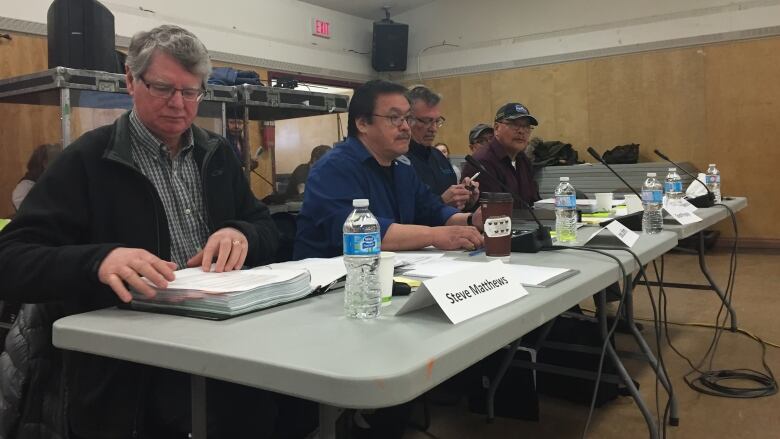Hearings begin in Behchoko, N.W.T., on Bluenose East caribou plan
'Our wildlife is in crisis. We need to have this discussion,' says former Tlicho grand chief

A proposed joint management plan for the declining Bluenose East caribou herd is calling for a reduction in harvesting for N.W.T. indigenous hunters.
The Tlicho and N.W.T. governments presented their plan to theWek'eezhii Renewable Resource Board during the first day of hearings in Behchoko, N.W.T. on Wednesday.
During the presentations, former TlichoGrand Chief Joe Rabescaacknowledged that some people will not agree and some people will beupset, but the measures are necessary for the survival of the herd.
"Our wildlife is in crisis. We need to have this discussion," he said in Tlicho.
2015 calving photo surveys show the herd has dropped to less than 40,000animals from100,000 in 2010.
John Nishi, biologist for the Tlicho Government, told the board breeding females in the herd had declined by about half between 2013 and 2015. He said there arean estimated 17,400 breeding females according to the last calving ground survey.
"If we project that rate into the future, by threeyears a 34 per cent reduction annually would result in 6,200 breeding females.
"That's unacceptable and management actions must be implemented."
Wolf harvesting program
The two key pointsof the management plan are reductions inhunting of the herd and in the number of predators such aswolves.
It calls for a proposed total allowable harvest of 950 bulls (preferably young) annually. Indigenous groups in the N.W.T. would be allotted611 (Tlicho 373, Sahtu 163, Dehcho 15, Inuvialuit 8, NWT Metis Nation 14, Akaitcho, 20, North Slave Metis Alliance 17) and 339 caribou for Nunavut.
The Tlicho Government has proposeda community-based wolf harvesting program on the declining Bathurst herd's winter range this year. If that program is successful, both groups agree it could be extended to the Bluenose East herd in 2016-2017.
The N.W.T. Department ofEnvironment and Natural Resourcespresented a similar management plan for the Bluenose East herdto the Sahtu Renewable Resource Board during hearings last month in Deline. The Sahtu board is also weighing a plan proposed by the community of Deline.
The hearings in Behchoko continue until Friday.












_(720p).jpg)


 OFFICIAL HD MUSIC VIDEO.jpg)
.jpg)



























































































